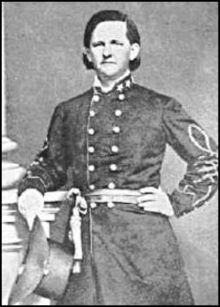In Montgomery, Alabama, delegates to the Deep South slaveholding states’ convention work in earnest to establish the legal and judicial basis of the new Confederate States of America, as well as to select a president for the new nation.
The preservation of African (black) slavery is foundational and central to the identity of the Confederacy. Some delegates use the language of states’ rights, also a reference to slavery.
Among convention delegates is Thomas R. R. Cobb (1823-1862, pictured), the brother of the better-known Howell Cobb (1815-1868), also of Georgia. Howell, despite frequenting a Baptist pew, never joins any church.
Samuel Boykin, a leading Georgia Baptist and author of the 1870 volume, A Memorial Volume of the Honorable Howell Cobb of Georgia, thus describes Howell’s religious inclinations:
General Cobb never made any open profession of religion by connecting himself formally with any church. But no man admired religion or a religious life more than he, and no man ever prayed more devoutly to receive the light of life. For many years he had been beset by doubts as to some essential points of the Christian religion. He struggled hard to dissipate his doubts, and in his discussions with ministers of the gospel with whom he was intimate, and with attached friends, he frankly stated his difficulties and sought for aid to remove them. He was a constant and devout worshiper at the Baptist church, and his private devotions were never forgotten. A few months before his death, in conversation with a devoted personal friend, he mentioned his religious troubles and his anxiety to remove them. His friend, who had experienced similar difficulties, and had had them removed by reading a little book, ” The Christ of History,” by Dr. John Young, recommended him to read it, and the result was the entire removal of his skepticism, and a perfect belief in all the saving doctrines of Christianity. He had resolved, on his return to Macon from a contemplated visit to the North with a portion of his family, to connect himself with the Church. His death at New York, on the 9th of October, 1868, prevented the execution of this purpose.” (pp. 48-49)
Howell is former United States Secretary of Treasury under President James Buchanan (1857–1860) and the 40th Governor of Georgia (1851–1853). Currently, he is a lawyer and Speaker of the Provisional Confederate Congress; in effect, provisional Head of State until a president is elected. Considering his long and successful political career, Cobb at this moment is a serious candidate for the presidency of the Confederate States of America.
For his part, Thomas hopes for a cabinet position in the Confederacy. Yet delegates soon rally around Jefferson Davis, U. S. Senator from Mississippi, for the presidency, and the grand hopes of the Cobb brothers never materialize.
Nonetheless, both brothers faithfully serve the Confederacy. During the war, Howell is appointed a brigadier general on February 13, 1862, and assigned command of a brigade in what becomes the Army of Northern Virginia. He continues in the service of the Confederate Army throughout the war. When near the close of the war Robert E. Lee considers arming slaves, Cobb bitterly opposes the move, insisting it negates the South’s justification of slavery on the basis of the inferiority of blacks. Afterwards, Howell returns home to Athens, Georgia – minus one of his (and wife Mary Ann’s) plantations, which Union General William Tecumseh Sherman had personally ordered burned to the ground during his march through Georgia – and resumes his law practice.
Younger brother Thomas, during the Confederate Congress, serves as chairman of the Committee on Military Affairs and on a committee that drafts the Confederate Constitution. Following the commencement of formal warfare, Thomas organizes Cobb’s Legion in the late summer of 1861 and is commissioned a colonel in the Confederate army on August 28, 1861, and assigned to the Army of Northern Virginia. Promoted to brigadier general on November 1, 1862, he is mortally wounded at the Battle of Fredericksburg, and dies from his wounds on December 13, 1862.
Sources: According to church records in Athens, Georgia, Thomas Cobb was a devout Presbyterian. Some other sources claim Thomas as a Baptist, however: see A. James Fuller, Chaplain to the Confederacy: Basil Manly and Baptist Life in the South (Louisiana State University Press, 2000), pp. 295-296.
Note: Special thanks to Arlette Copeland, of Mercer University’s Jack Tarver Library’s Special Collections, for pointing me to Boykin’s volume on Howell Cobb. Also, special thanks to Sam Thomas, Curator, T. R. R. Cobb House, Athens, Ga. for pointing out that Howell Cobb, through wife Mary Ann, owned a number of plantations.



